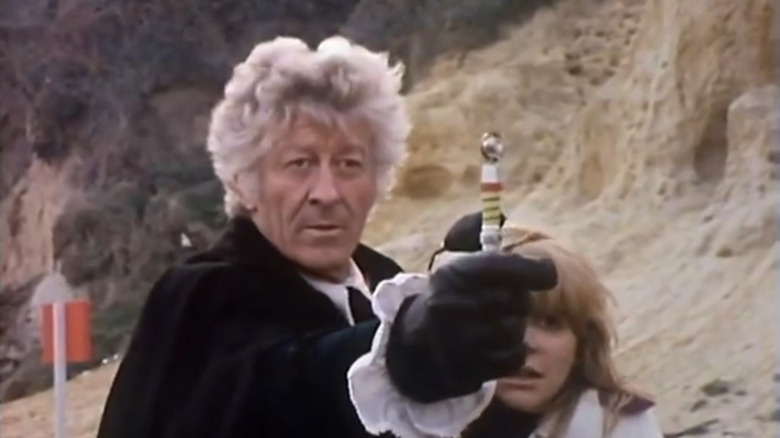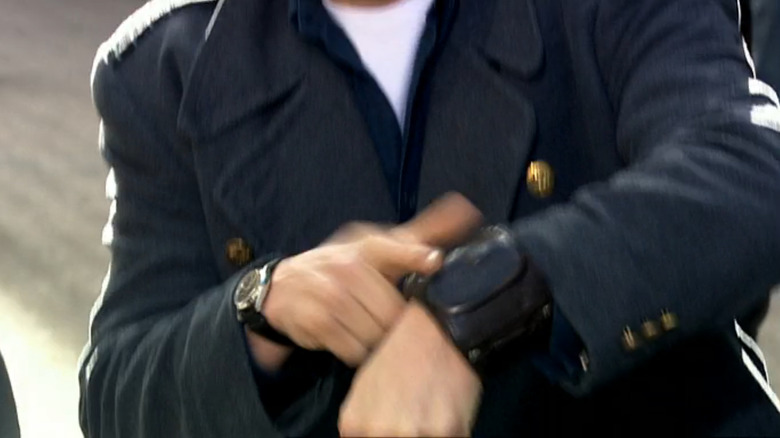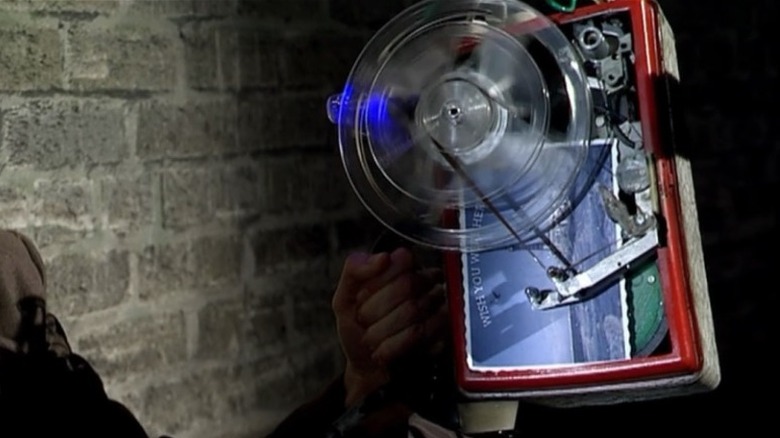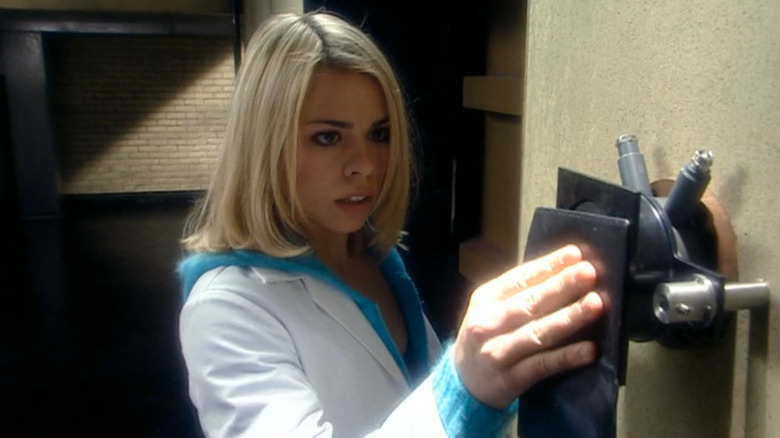6 Iconic Doctor Who Gadgets That We Wish Were Real
As the longest-running science-fiction show on television, "Doctor Who" has captured the imaginations of generations. The massive success of the BBC series is not only because of the talented actors who portray the Doctors and their companions, but also because of the unique science-fiction concepts invented by the writers and showrunners. At its core, "Doctor Who" offers a wish fulfillment fantasy expressed through the Doctors themselves. The Doctor's many companions, pulled from their ordinary lives to journey with him across space and time, make audiences feel like they, too, could be whisked away from their dreary mundanity to explore distant galaxies, impossible futures, and dusty pasts. Today, the series is so popular that it was picked up to stream on Disney+ to usher in the Fifteenth Doctor played by Ncuti Gatwa.
The world of "Doctor Who" is fleshed out with a procession of impossible technologies and gadgets. From time travel machines of various proportions to seemingly normal, everyday items that have capabilities far beyond what you might suspect, these devices have made fans wish they were real. This, too, is part of the "Doctor Who" wish fulfillment fantasy, as it represents the power that the Doctor exposes his companions to. So, we rounded up some of the coolest "Doctor Who" gadgets we wish existed in real life. Let's dive in, or, as the Tenth Doctor would say, allons-y!
Sonic Screwdriver
Let's start with the obvious. If you've watched even a single episode of "Doctor Who," you've found yourself wishing sonic screwdrivers were real. Far from simple, these funky digital wands are the Doctor's deus ex pocket, able to solve seemingly any problem with a wibbly wobbly wave. They can give readouts about the environment and area around them. They open locked doors, fix broken machinery, hack computer systems, and more. In fact, listing everything The theDoctor has used the sonic for over the course of the historic series could fill a book. Sonic screwdrivers are able to interface with virtually any technology — analog or digital — and enact the user's will upon it. They even act as a defensive weapon, since they can scramble other people's weapons and cause them to malfunction.
With a sonic screwdriver, you'd never need to worry about misplacing your keys or forgetting a bank password. Repairing your home, computer, or time machine would be easier than ever. Of course, there are downsides to a sonic screwdriver. They don't work on wood, for starters. And if they were real, chaos would reign as people opened locked doors willy nilly, broke into houses and banks as easily as walking into a grocery store. Still, it's hard not to crave this ridiculously overpowered plot contrivance of a gadget. We'd probably take Thirteen's (Jodie Whittaker) sonic. She built it out of scrap metal!
Literally any cell phone (Super Phones)
One of the gadgets we crave most from "Doctor Who" is any cell phone featured. There's nothing special about these devices on the surface. Many of them are decades out of date and don't even run apps. Nor are they fictional inventions, as most of the props used are real cell phones from companies like Nokia or Motorola. But when in the company of the TARDIS, any humble cell phone can be transformed into a Super Phone that can make calls across any distance of time and space. Using this technology, the Doctor's companions are able to call their loved ones back in the time they left Earth, regardless of how many millennia into the future or past they've traveled.
The implications of this are astonishing, as anyone with a Super Phone can effectively call anyone who owns a phone at any point in time. That means you could theoretically call your deceased loved ones long after their passing, or get in touch with your future descendants. You could call people before disasters occur to spare their lives, or ask people from the future what's going to happen later in your timeline. Of course, like most of the tech in "Doctor Who," this magical plot contrivance has zero chance of becoming real. Like the TARDIS and the Doctor themselves, it's a wish fulfillment fantasy that allows fans to imagine the impossible.
The TARDIS
Another gadget that appears in nearly every episode and is an obvious pick here is the TARDIS, the Doctor's space and time machine that's bigger on the inside. Any one of those capabilities would be sufficient to justify wanting it to be real, but together, it's the most overpowered spacecraft in the history of science-fiction. And yet the capabilities of the TARDIS don't stop there. It's proven itself countless times to be virtually indestructible, able to be caught inside a supernova without suffering damage. It's an invulnerable time machine that travels through space and doubles as a mansion. Oh, and it repairs and remodels itself to stay up to date with the latest design trends. Who wouldn't want that?
Not only that, but the Doctor's TARDIS is broken, so just imagine how much nicer a new one would be. The iconic noise it makes when taking off and landing, as well as its permanent appearance as a police call box, are because its Chameleon Circuit — the part that allows it to change into various everyday objects to avoid detection — was broken. If TARDISes were real and you could pop down to a dealership, they'd sell you a TARDIS that could disguise itself as anything you wanted and take off in total silence. But even the Doctor's malfunctioning TARDIS would be an obvious upgrade over your Toyota.
Vortex Manipulator
Second to the TARDIS, "Doctor Who" time travelers use Vortex Manipulators. These wrist-mounted devices allow people like Captain Jack Harkness (John Barrowman) to hop through time with ease. There are some advantages to this. Whereas the Doctor must leave their TARDIS behind on each adventure, those with Vortex Manipulators have time travel at their beck and call no matter where they are. They are usually issued to members of the Time Agency, a top secret squad of time-traveling spies from the 51st century. Newer models of the Vortex Manipulator left no trace of their use, meaning other time travelers couldn't follow a Time Agent through time by tracking the signal.
The Vortex Manipulator would be massively useful for all the same reasons as any other time machine, but whereas other "Doctor Who" time machines like the TARDIS can be imprecise, the benefit of a Vortex Manipulator is that, in addition to its portability, it is extremely precise in calculating the moment of time to which a user travels. Whereas the Doctor often winds up in an approximation of the time period he wants to visit, Time Agents can land precisely when they mean to, which is why their activities are undetectable. They are able to change the course of history with surgical accuracy.
The biggest downside of these wrist mounted time machines is that they can easily be stolen or lost. Time Agents are usually careful to protect their Vortex Manipulators, lest they fall into the wrong hands and leave the Agent stranded in time.
Timey-Wimey Detector
One of the most beloved quotes from "Doctor Who" is the phrase, "Timey-wimey," coined by the Tenth Doctor (David Tennant) to describe a machine he had built to detect temporal anomalies. It appeared in the episode, "Blink," one of the most beloved episodes from past and present showrunner Russell T. Davies' first run on "Doctor Who," although the episode itself was written by his successor, Steven Moffat. In the episode, the Doctor coaches people through a time conundrum involving Weeping Angels, quantum-locked assassins who project people backward in time, take the form of statues, and can only move when they're not being looked at. The function of the Timey-Wimey Detector, as the Doctor puts it, is that, "It goes 'ding' when there's stuff."
The Timey-Wimey Detector has one significant drawback: it boils any egg within 30 packs of the machine, killing any birds they happen to still be inside of. Honestly, it would be worth owning one just to get the perfect boiled egg each morning at breakfast, to say nothing of the ability to detect people displaced from their time in the area.
Psychic Paper
Of all the "Doctor Who" gadgets that would be amazing to have, only the most chaotic among us will choose psychic paper. It's a sheet of paper that shows a viewer what their mind expects them to see. The user can manipulate its properties, too. For example, when the Doctor wants to gain entry to a government facility, he shows his psychic paper to a guard, who sees high ranking military credentials or whatever else is necessary to let the Doctor inside. While the Doctor uses this power for the good of humanity, it's easy to see how much mischief someone could get up to if this technology existed in real life.
More than ever, entry into prohibited spaces is guarded by digital locks rather than people posted at the door, and often both human and digital security is in place. Think about how luxury apartments used to have doormen to let residents inside, but now have apps. But as we clearly see in episodes like Season 2's "Army of Ghosts," where Rose Tyler (Billie Piper) uses psychic paper to bypass electronic security on a vault door, it can even trick computer systems.
In real life, AI might bring us closer to the chaos that psychic paper would unleash. For example, the Google Pixel 9 series's Reimagine feature can add things that do not exist to a photo, such as putting car accidents in a photo of an empty street, capabilities which some worry could be used for insurance fraud or other nefarious purposes.






